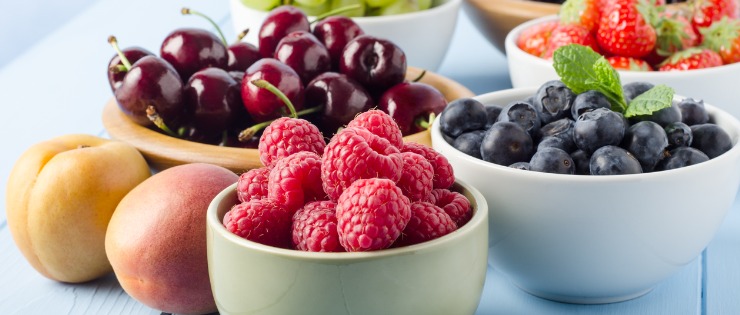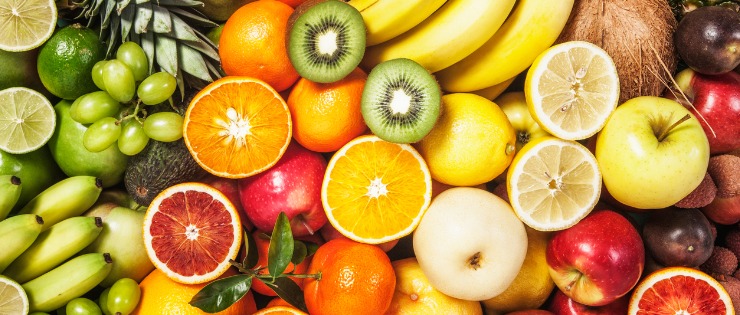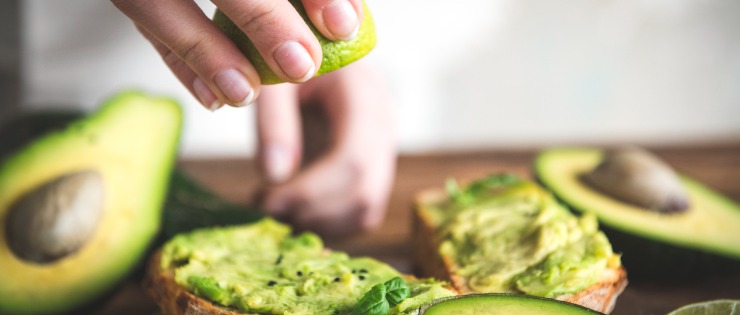
Most of us grew up being told to eat a piece of fruit if we were hungry. It seemed you could eat it all day long and your parents would be happy. Fruit is a good source of vitamins and dietary fibre and is an important part of a balanced diet, but is there a limit to the amount of fruit you should consume?
The 2 and 5 Rule
According to Nutrition Australia, the healthy eating pyramid includes the recommendation to eat two fruits and five vegetables each day. The pyramid began in Sweden in the 1970s encouraging people to fill most of their daily food intake with fruits, vegetables and grains. Eating 2 and 5 is an easy rule of thumb for people to remember - two fruits and five vegetables. However, a survey in 2014-15 showed only 49.8% of Australian adults ate the recommended two or more servings of fruit and only 7% of adults eat five or more servings of vegetables per day.
What is a Serve of Fruit?
Not all fruit is considered one serve. A standard serve is about 150 grams (350kJ) which equates to:
1 medium sized apple, banana, orange or pear
2 small apricots, kiwi fruit or plums
1 cup diced or canned fruit, with no added sugar
Or for occasional eating:
125ml fruit juice, with no added sugar
30 grams dried fruit

Categories of Fruit
Fruit comes in all different shapes and sizes.They also come in categories including:
Pome fruits which have a core and include apples and pears
Citrus fruit includes oranges, mandarins and grapefruit
Stone fruit such as apricots, cherries, peaches, nectarines and plums
Tropical fruit includes bananas, paw paw, mangoes, pineapple and melons
Berries include strawberries, raspberries, blueberries, kiwi fruit and passionfruit
Melons such as watermelons, rockmelons and honeydew melons
Tomatoes and avocados
Health Benefits of Eating Fruit
Fruits have a range of vitamins and antioxidants that offer important health benefits.
Fruit is high in fibre and low in kilojoules which makes you feel fuller and satisfied for longer compared to many other food choices. Eating fruit contributes to your recommended daily fibre intake which can help protect you from bowel cancer.
Vitamins C and E and different phytochemicals may reduce the risk of cardiovascular conditions. Potassium and magnesium can also lower blood pressure.
Orange, red and yellow fruits contain carotenoids (vitamin A) which assists immune function. Eating fruit may also help lower your cholesterol level.
When we’re eating fruit between meals, we’re often making a healthier choice than other snack foods which may be higher in sugar, salt, fat and offer little nutritional value.

Are Some Fruits Superfoods?
While there’s no scientific ‘superfoods’, some foods have been promoted as being superior to others because of the potential health benefits they provide. Some fruit contains nutrients and antioxidants that see them included on the ‘superfoods’ list, but it’s recommended that we eat a diverse and balanced diet and not one based on superfoods alone.
Avocados – Half an avocado offers 7% of the recommended daily intake of magnesium which helps with regulating blood pressure, blood sugar and reduces the risk of type 2 diabetes which is linked to magnesium deficiencies.
Blueberries - A high number of anthocyanin pigments give them their unique colour and act as powerful antioxidants that may lower the risk of diabetes, heart disease, and degenerative diseases like Alzheimer’s Disease.
Citrus fruits – With their high fibre and vitamin C content, oranges, lemons and limes are thought to boost the immune system and reduce the risk of developing macular degeneration.
Strawberries - Being full of antioxidants, strawberries can help fight against cancer-causing free radicals.
Pineapples - rich in vitamin C and manganese and an enzyme called bromelain which helps fight diabetes, heart disease and cancer.

How Much Fruit is Too Much?
If you’re eating more than two serves of fruit per day, you’re at risk of high blood sugar levels and weight gain. Also, by eating more than two servings of fruit per day, you may be missing out on other healthy foods which offer different nutrients not available in the fruit.
Some of the potential health problems related to consuming too much fruit include:
Dental Issues
Some forms of fruit are worse than others for our teeth. Fruit juice is acidic and can cause dental erosion and its high sugar content can cause cavities when drunk regularly. Dried fruit is sticky and high in kilojoules so it can cause dental decay.
Weight Gain
Fruits have a high sugar and carbohydrate content which can cause unwanted weight gain. By eating more than two servings of fruit per day, your diet may be high in sugar contributing to weight gain.
Too Much Fibre
Fibre is an important part of a balanced diet and most people aren’t eating enough of it. But not everyone can tolerate a high fibre diet as it may cause them gas, pain and bloating. Drinking water can help digest fibre.

Sugar in Fruit
Fruit has natural sugars called fructose. The body metabolises natural sugar in fruit differently to the refined sugar added to processed foods. Refined sugar breaks down quickly, causing insulin and blood sugar levels to spike rapidly. You’re less likely to feel full after eating foods with refined sugar. But the fibre in fruit slows down your metabolism. The fruit makes the stomach expand so you feel full faster and for longer.
However, once the sugar passes through the stomach and reaches the small intestine, the body treats all sugar the same. If your body already has enough sugar in the system and doesn’t need it for energy, it will be stored as fat.
Choose Whole Fruit Over Juice
Fruit is most nutritious when it’s eaten raw and fresh. Some juicers remove the pulp of the fruit which contains the most fibre and makes you feel full so you’re less likely to overeat and consume too much natural sugar compared to eating whole, fresh fruit. It takes around three oranges to make one cup of fresh orange juice.
Health Rating for Fruit Juice
In early 2021, a decision was made by the majority of The Australian and New Zealand Ministerial Forum on Food Regulation to rate 100 per cent juice according to its sugar content and not give it any extra points for being juice. The decision means that some fruit juices with a high sugar content can score as low as 2.5 stars in the health rating compared to some diet soft drinks with no sugar scoring as high as four stars. The rating change recognises that drinking fruit juice on a regular basis can cause tooth decay and obesity.

Which Fruits Have the Most Sugar?
For most people, they don’t need to worry about the sugar content of fruit. The refined sugar that’s hidden in processed foods and treats can be a far bigger problem. But if you’re watching your weight and wanting to reduce the number of kilojoules you’re consuming, you may choose one fruit over another due to the quantity of natural sugars it contains.
Fruits with the highest quantity of sugar:
Mangoes
Grapes
Watermelon
Cherries
Bananas
Pears
Fruits with the lowest quantity of sugar:
Strawberries
Peaches
Oranges
Grapefruit
Avocados
Which Fruits Have the Most Carbohydrates?
Like sugar, carbohydrates get a bad rap. But carbohydrates are an important nutrient for helping the body function properly and thrive. Refined carbs are processed and offer little to no nutritional value but unprocessed and whole food sources of carbohydrates found in fruit are nutritious and healthy. Carbs in fruit are mostly in the form of sugar. Someone on a low-carb diet may choose to cut out fruit from their diet but it’s likely they’re missing out on important nutrients.
Bananas, mangos and apples are fruits with some of the highest sources of carbohydrates. If you’re watching the amount of carbs in your diet, choose rockmelon, coconut flesh, watermelon, peaches, oranges and mandarins.
Can You Eat Too Many Vegetables?
Fruit is higher in sugar and calories than non-starchy vegetables so nutritionists recommend a higher daily intake of vegetables than fruit (five vegetables compared to two fruits).
Vegetables have much higher nutritional values compared to fruit and offer more iron, calcium, vitamin C and Vitamin A than fruit. The top five vegetables by iron per 100 grams have far greater quantities than the top five fruits which have tiny quantities of iron in comparison. Spinach cooked and raw has the greatest iron and calcium content. Yellow and red capsicum rank highest for vitamin C but kiwi fruit comes in third. No fruits can compare to the vitamin A content of sweet potatoes, carrots and many other vegetables.

Tips for Selecting Fruits
Eat Fruits in Season – when you buy fruit in season, you’re getting fresh fruit at the best possible price. Eating fruit out of season may mean it has been imported and is likely to be more expensive.
Eat a Rainbow – When you choose different coloured fruits, you’re more likely to get a good mix of vitamins and minerals that can reduce your risk of some illnesses.
Choose Whole Fruit – By eating whole fruit instead of a juice you’re eating the pulp which is high in fibre and satisfying so you’re less likely to consume too much sugar.
Keep the Skin – The most fibre is found in the skin of fruit so keep it on for the health benefits and to help suppress appetite to prevent overeating and weight gain.
Fruit is an excellent source of fibre and nutrients in our diet. It’s a perfect choice if you’re looking for a sweet treat between meals. Always choose fruit with its natural sugar and high fibre quantity over a snack loaded with refined sugar.